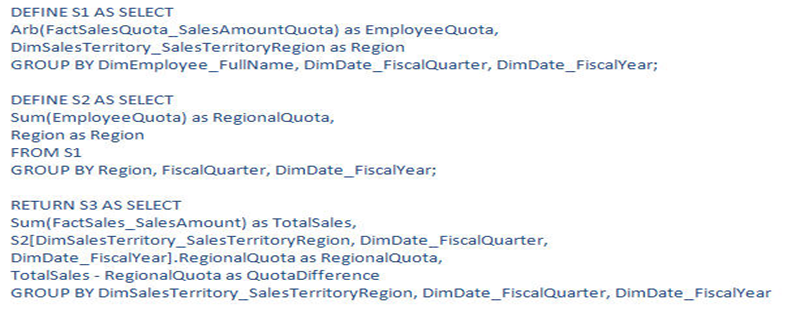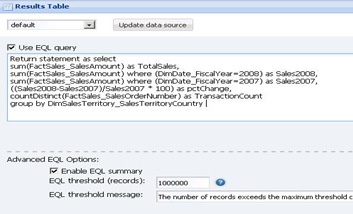About
EQL is the Endeca Query Language that permits you to retrieve data.
The view manager can be used as EQL client.
Articles Related
Syntax
Simple EQL statements can be broken down into five primary components:
/* Comments */
RETURN
SELECT
[Expressions]
GROUP BY
ORDER BY�
Clauses are not case-sensitive Standard and managed attribute references are case-sensitive
Words
- WHERE
- HAVING
- IN
- DEFINE
- Lookups
- FROM
- GROUP BY hierarchy
- PAGE
- PERCENTILE
- CASE
- JOIN
RETURN
Provides the key for accessing results from the Oracle Endeca Server query result
RETURN "MyExample" AS SELECT COUNT(1) AS �"TotalCount” GROUP
SELECT
Specifies one or more expressions to evaluate for an EQL statement
SELECT <expr1> AS <key1>, <expr2> AS <key2>…
GROUP
“Group” define the buckets.
RETURN "MyExample" AS
SELECT �
AVG("Gross") AS "AvgGross",
SUM("Gross") AS "TotalGross"
GROUP
RETURN "Example" AS
SELECT �
AVG("Gross") AS "AvgGross", �
SUM("Gross") AS "TotalGross"
�GROUP BY “Regions”
DEFINE
Used when statement is only intended as input for another statement
FROM
Allows a previous DEFINE statement’s results to be the current statement’s input record set.
Essentially, FROM allows EQL statements to be nested (for instance, in the case of a view)
Without a FROM component, an EQL statement will always refer to the base record set returned by the Navigation query.
Note that you may only have one FROM per query.
The default FROM is the current navigation state.
DEFINE "Customers" AS SELECT
ARB("Cases Produced") AS "CasesProduced"
GROUP BY "Customer Id";
RETURN "Example" AS SELECT
AVG("Customers"["CustomerId"]."Cases Produced")
AS "AvgCasesProduced" FROM "Customers"
GROUP
WHERE
WHERE Allows filtering of records prior to analysis and can be either per-expression (Per Attribute) or global (for the whole query). The placement of the “WHERE” word before or after the “AS” word determines the scope.
- Per-Expression (Per Attribute)
Return statement as select
sum(FactSales_SalesAmount) where (DimDate_FiscalYear=2008) as Sales2008,
sum(FactSales_SalesAmount) where (DimDate_FiscalYear=2007) as Sales2007,
((Sales2008-Sales2007)/Sales2007 * 100) as pctChange,
countDistinct(FactSales_SalesOrderNumber) as TransactionCount
group
The Per-Expression scope is handy to define metrics in a metrics bar studio component
- Global (for the whole query)
RETURN QuarterTotals AS SELECT
SUM("Gross") AS "SalesTotal"
WHERE "Sales Managers"='Titus Arden'
GROUP BY BookingQuarter"
Global WHERE clauses are not frequently used, since Navigation or Record Filters can be used instead.
HAVING
Allows filtering of records after analysis (grouping)
RETURN "Example" AS SELECT
"Customer Id" AS "Customer Id",
AVG ("Gross") AS "AvgGross",
SUM ("Gross") AS "TotalGross"
GROUP BY "Customer Id"
HAVING "TotalGross" > 1000000
ORDER BY "TotalGross" DESC
IN
Is used as a filter in either the WHERE or HAVING clause
DEFINE TopFive AS SELECT
SUM ("Gross") AS "TotalSalesPerCustomer"
GROUP BY "CustomerId"
ORDER BY "TotalSalesPerCustomer" DESC� PAGE (0,5);
RETURN Others AS SELECT
SUM ("Gross") AS "TotalSales"
WHERE NOT ["CustomerId"] IN TopFive
GROUP
Lookups
Provide the ability to refer to derived values in record sets that have been previously computed. Lookups can only refer to an EQL statement that was grouped and whose GROUP BY list matches the Key list indicated between the brackets.
Usage:
StatementName[KeyList].DerivedProp
Below: “Totals”[Regions].“TotalSales” is a lookup.
DEFINE "Totals" AS SELECT
SUM("Gross") AS "TotalSales",
GROUP BY Regions;
RETURN "TotalSalesPerRegion" AS SELECT
SUM("Gross") AS "TotalSalesPerRegion",
("TotalSalesPerRegion" /"Totals"[Regions]."TotalSales") * 100 AS PctOfTotal
GROUP BY "Regions", "Varietals"
COALESCE
COALESCE returns the first non-null value from a provided list of expressions.
RETURN "Total Sales by Region"
AS SELECT
SUM(COALESCE("Audit Sales","Sales","0.0")) AS "TotalSales" GROUP BY Region
The COALESCE expression allows for user-specified null-handling. You can use COALESCE to evaluate records for multiple values and return the first non-null value encountered, in the order specified. The following requirements apply:
- You can specify two or more arguments to COALESCE
- Arguments that you specify to COALESCE should all be of the same type
- The types of arguments that COALESCE takes are: integer, integer64, double and string
- You cannot specify managed attributes as arguments to COALESCE. However, you can specify a standard attribute as arguments to COALESCE resulting in a valid query.
- The COALESCE expression can only be used in a SELECT clause, and not in other clauses (such as WHERE)
CASE
If no condition matches, result is NULL
RETURN Result AS SELECT
CASE
WHEN (AgeInWeeks = 0) THEN 'Past 7 Days'
WHEN (AgeInWeeks = 1) THEN 'Prior 7 Days'
ELSE 'Other'
END AS “Label”,
count(1) as RecordsCount
Group By Label
Operator
Mathematical
+ , - , * , /
Logical
- OR
- AND
- =
- >
- <
- <=
- >=
- IS NULL
Quotes
Double
When referring to a Key, whether it is an original attribute, a derived attribute, or a reserved word.
SELECT "orderSize" AS "size"
WHERE "orderSize" > '2'
GROUP BY "orderSize"
Single
When referring to a Literal, whether it is a string constant or a number.
WHERE "orderSize" > '2'
WHERE "companyName" = 'IBM'
SELECT 'Others' AS "Name"
None
Double quotes can be left off when the Key is a single word. One exception is if that word is reserved (e.g. Year).
- ALLOWED:
SELECT "Order Size" AS size
SELECT P_Year AS "Year"
- NOT ALLOWED:
SELECT Order Size AS "size"
SELECT "P_Year" AS Year
Single quotes can only be left off for a number.
- ALLOWED:
WHERE "Order Size" > 2
SELECT 100 AS "Number"
- NOT ALLOWED:
WHERE "companyName" = IBM
SELECT Others AS "Name"
Order of Processing
Studio EQL-enabled components
There are six Studio EQL-enabled components:
- Alerts
- Chart
- Cross Tab
- Map
- Metrics Bar
- Results Table



